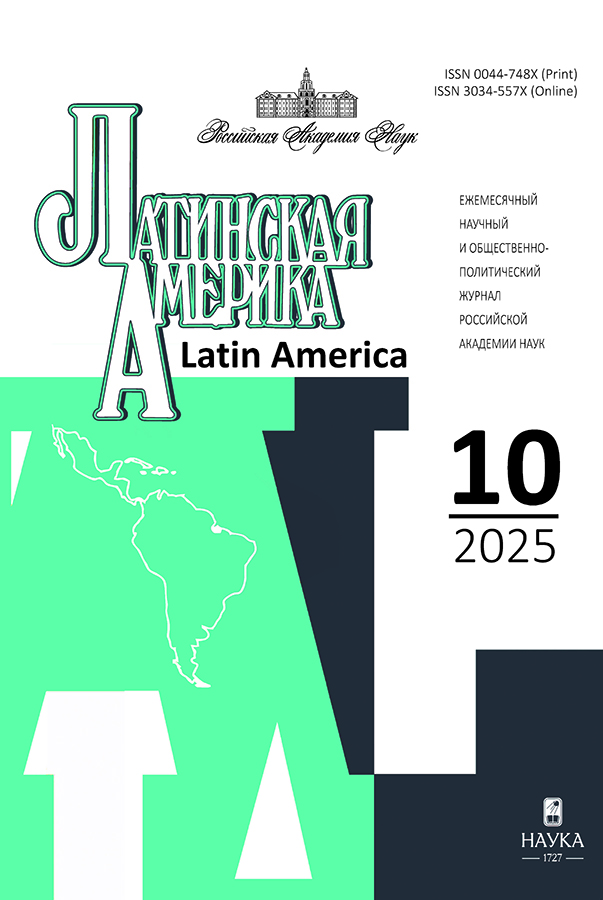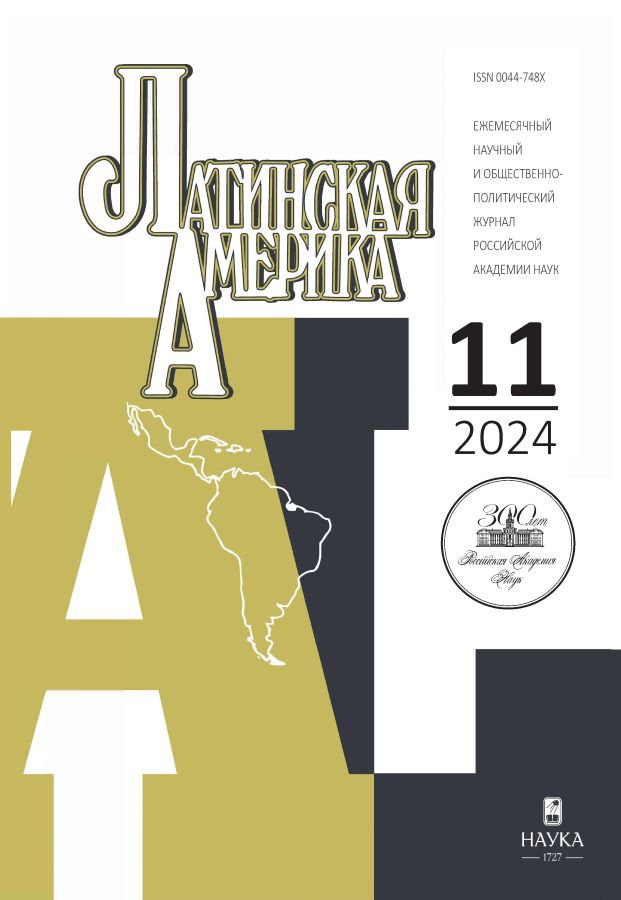Участие индейцев в войне за независимость Чаркас
- Авторы: Щелчков А.А1
-
Учреждения:
- Институт всеобщей истории РАН
- Выпуск: № 11 (2024)
- Страницы: 83-95
- Раздел: Страницы истории
- URL: https://ter-arkhiv.ru/0044-748X/article/view/668016
- DOI: https://doi.org/10.31857/S0044748X24110063
- ID: 668016
Цитировать
Полный текст
Аннотация
Война за независимость на территории современной Боливии продолжалась долгие 15 лет. Это была война освободительных походов, восстаний патриотов, партизанского движения, что сделало территорию колонии местом, где никакая победа роялистов не гарантировала спокойствия. Подавляющее большинство населения аудиенсии Чаркас — индейцы аймара и кечуа, труд которых обеспечивал благополучие колонии и стабильный доход метрополии. Это большинство во многом определяло будущее независимости Боливии. Индейцы стали важными действующими лицами Войны за независимость в Чаркас, от их позиции зависела судьба противников, но при этом индейцы никогда не принимали ни одну из сторон, а действовали в соответствии со своими конъюнктурными интересами, вступали в ситуационные альянсы с креолами, метисами и испанцами. Целью индейцев было сохранение «пакта взаимности» с миром белых — будь то с короной, будь то с патриотами, что предполагало автономию индейцев и гарантии ограничения эксплуатации. Индейцы стремились выжить в новых политических условиях, хотели, чтобы их образ жизни, особые права и интересы были признаны. Им удалось отстоять свой «проект» в рамках кардинальных перемен времен войны, поэтому тот факт, что буквально через пару лет после провозглашения независимости республиканские правительства восстановили старый режим, не вызвало недовольства и возмущения индейского населения.
Ключевые слова
Об авторах
А. А Щелчков
Институт всеобщей истории РАН
Email: sch2000@mail.ru
ORCID iD: 0000-0002-7780-781X
доктор исторических наук, главный научный сотрудник Москва, Россия
Список литературы
- Valencia Vega A. El indio en la independencia. La Paz, Progreso, 1962, 377 р
- Arnade C. La Dramática insurgencia de Bolivia. La Paz, Juventud, 1979, 299 р.
- Arze Aguirre R. Participación popular en la independencia de Bolivia. La Paz, OAE, 1979, 271 р.
- Demélas M.-D. Nacimiento de la guerra de guerrilla. El diario de José Santos Vargas (1814—1825). La Paz, Plural, 2007, 457 р.
- Reescrituras de la Independencia. Actores y territorios en tensión / Barragán R., Soux M.L., Seoane A.M., Mendieta P., Asebey R., Mamani R. La Paz, Plural, 2012, 540 р.
- Mendieta O.P. Pescando el río revuelto: la participación indígena en la Republiqueta de Ayopaya (1812—1825). Anuario de estudio bolivianos, archivísticos y bibliográficos. Sucre, 2004, N 10, 2004, рр. 393-409.
- Soux M.L. Rebelión, guerrilla y tributo: los indios en Charcas durante el proceso de independencia. Anuario de Estudios Americanos. Vol. 68, N 2. Sevilla, 2011, рр. 455-482.
- La eclosión juntera en el mundo hispano. México, FCE, 2007, 404 р.
- Documentos para la historia de la Revolución de 1809. Vol. III. La Paz, Alcaldía Municipal, 1954, 996 р.
- Dávila T. Insurrección de La Paz, 1809. Manuscrito. Biblioteca nacional de España. MSS/13150, 64 р.
- Choque Canqui R. Situación social y económica de los revolucionarios del 16 de julio de 1809 en La Paz. La Paz, Gobierno Municipal de La Paz, 2008, 147 р.
- Memorias históricas de la revolución paceña. La Paz, Imprenta de Colegio de artes, 1840, 45 p.
- Roca J.L. Ni con Lima ni con Buenos Aires. La formación de un Estado nacional en Charcas. La Paz, Plura, 2007, 771 р.
- Siles Salinas J. La Independencia de Bolivia. Madrid, MAPFRE, 1992, 406 р.
- Cortés M.J. Ensayo sobre la historia de Bolivia. Sucre, Impr. Beeche, 1861, 332 р.
- Ramallo J.M. La guerra religiosa en el Alto Perú (1811—1813). Cuatro Congreso internacional de historia de América. Tomo V. Buenos Aires, 1966, 755 р.
- Fellmann Velarde J. Historia de Bolivia T.1. Los antecedentes de la bolivianidad. La Paz, Amigos de los libros, 1968, 342 р.
- Una independencia, muchos caminos. El caso de Bolivia (1808—1826). Castelló de la Plana, Universitat Jaume I, 2008, 244 р.
- Fiestas triunfales que consagró el 2 de agosto de 1812 la fidelísima Imperial Villa de Potosí al invicto General americano el Sr. mariscal de campo Don José Manuel de Goyeneche. Lima, 1812, 60 р.
- Irurozqui M. La vecindad y sus promesas de vecino a ciudadano, Bolivia, 1810—1830. Anuario del Archivo y Biblioteca Nacionales de Bolivia. Sucre, 2000, N 8, pp. 203-227.
- Camba A. Memorias para la historia de las armas españolas en el Perú. Tomo 1. Madrid. 1846. Available at: https://www.archivoybibliotecanacionales.org.bo (accessed 26.07.2024).
- Archivo de La Paz (ALP). EC. C. 150. E. 5. 1812.
- Ventura y desventura de la ciudad de La Paz después de Julio de 1809. La Paz, Gobierno Municipal de La Paz, 2009, 220 р.
- ALP. EC. C.150. E. 4. 1812.
- Arguedas A. Historia de Bolivia. La fundación de la república. T.1. La Paz, Juventud, 1992, 337 р.
- Araujo Subieta M. Tres importantes documentos sobre el guerrillero Miguel Betanzos. Anuario del Archivo y Biblioteca Nacionales de Bolivia. Sucre, 2011, N 17, рр. 67-102.
- Entre la Colonia y la República. Insurgencias, rebeliones y cultura política en América del Sur. Buenos Aires, Prometeo, 2008, 400 р.
- Santos Vargas J. Diario de un soldado de la independencia. Available at: https://www.archivoybibliotecanacionales.org.bo (accessed 26.07.2024).
- Pezuela J. Memorias de Gobierno. Sevilla, Escuela de estudios hispanoameicanos, 1947, 480 р.
- Bonifaz M. Legislación agrario-indigenal. Cochabamba, Universitaria, 1953, 595 р.
- Lofstrom W.L. La presidencia de Sucre en Bolivia. Caracas, Academia Nacional de Historia, 1987, 550 р.
Дополнительные файлы










